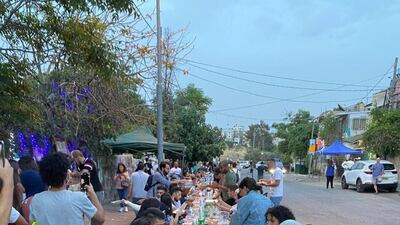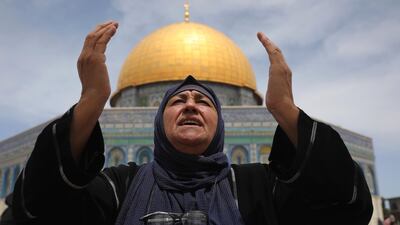Palestinian families facing eviction from their homes in East Jerusalem’s Sheikh Jarrah neighbourhood have organised large iftar meals this Ramadan to draw international attention to the threat to their community.
Throughout the holy month, extended families and their friends have broken their day-long fasts together, celebrating their Palestinian heritage in the tiny neighbourhood.
Violent protests have erupted in Sheikh Jarrah in recent days over Israeli threats to evict the families, who have lived in the area for decades, to make way for Jewish settlers.
As the large families gathered on Monday, some members stood out in their keffiyehs, the chequered scarves that have become a symbol of Palestine.
University student Asala Al Qasim, 23, one of the Palestinians whose family could lose the home in which they have lived for generations, helped to prepare some of the food.
It included traditional Palestinian dishes such as maqluba – a casserole of lamb or chicken, with aubergines, rice, cauliflower, carrots and a homemade sauce.
Ms Al Qasim said the meals were a proud display of Palestinian identity.
"It's part of our campaign to draw the world's attention to our fight against the illegitimate attempt to kick us out of the house of my grandparents," she told The National.
“They used to live here in the same house that we inherited from them.”
Ms Al Qasim said her family were determined to stay in Sheikh Jarrah.
“We won’t leave our house," she said. "We grew up watching our mother defending me, my sister and two brothers against several bids by settlers and Israeli courts to confiscate our home.”
An Israeli court issued a ruling in 2009 giving ownership of the family’s house and courtyard to settlers, Ms Al Qasim said.
“At that time, our mother didn’t have the power of social media like us today," she said. "She died two years ago and we won’t let her down. I can still smell my mother in the house.”
Jerusalem has witnessed decades of unrest related to the Israeli-Palestinian conflict.
But much of the recent violence in East Jerusalem and at Al Aqsa Mosque stems from attempts by Jewish settler groups to evict Palestinians from at least 28 houses in Sheikh Jarrah.
A lower court ruling this year endorsed the settlers’ claims to some properties, which infuriated Palestinians.
A Supreme Court hearing on a Palestinian appeal had been set for Monday, but the Israeli Justice Ministry said on Sunday that, in light of "all the circumstances", it would delay the case.
For the Palestinian families of Sheikh Jarrah, the dispute is not just about property.
The Palestinians claim East Jerusalem as their future capital, while Israel regards the entire city as its "undivided capital".
‘We wish to have Ramadan all year long’
Supporters of the Sheikh Jarrah families facing the loss of their homes have gathered with them throughout Ramadan in a show of solidarity.
About 6.30pm, on almost all of the past 29 days, Mahmoud Al Husseini has broken his fast with them.
Mr Al Husseini, 27, an engineer from Jerusalem, has prayed with them after iftar, and together they have danced the traditional dabke.
"I have been keen to come all the way to Sheikh Jarrah as a sign of sympathy, as every family has pitiful stories to tell about their struggle with Jewish settlers," he told The National.
“The Israeli occupation forces have denied me and my friends access several times. They only allowed us in during the early days of Ramadan when the situation was calm."
Mr Al Husseini said the group iftar in Sheikh Jarrah was the brainchild of young maqdisis, an Arabic description for the Palestinians in Jerusalem.
“We saw ourselves the deliberate acts of provocation from Jewish settlers – swear words, loud songs in Hebrew during the adhan [call to prayer], throwing stones and eggs at us, to mention but a few examples,” he said.
Some of the iftar participants bring their own meals to share with others.
The long table spreading across one of the streets was filled with unmistakable Palestinian cuisine ingredients such as zaatar, olive oil and khubz, which is flatbread baked at home.
Ramadan is always a special time for Muslims but this year was especially meaningful for the community in Sheikh Jarrah.
Ms Al Qasim said her family hoped that the spirit of solidarity they were able to foster during the holy month would continue afterwards.
“We wish to have Ramadan all year long to sustain this wonderful sense of solidarity with us, not just from fellow Palestinians but also from Muslims worldwide,” she said.
As the faithful around the world prepare to celebrate Eid Al Fitr, Ms Al Qasim’s family is ready to continue the fight for their home.
Additional reporting Salem Al Rayyas in Gaza












